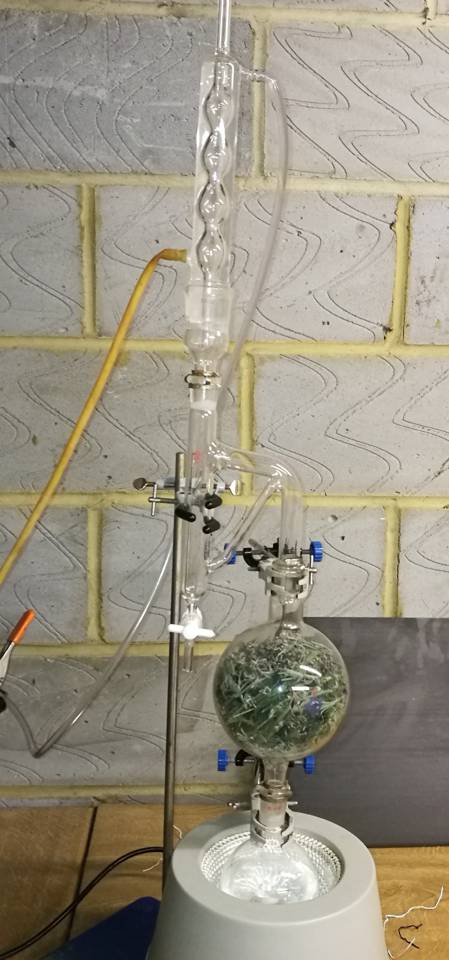
FAQ About Indoor Plant Aromatic Essential Oil Extraction

What is essential oil extraction from indoor plants?
Essential oil extraction from indoor plants involves obtaining the concentrated volatile compounds from aromatic plants. These oils capture the plant's scent or "essence" and can be used in aromatherapy, perfumery, or wellness products. The extraction can be done through various methods such as steam distillation or cold pressing, depending on the plant material.

Which indoor plants are best for essential oil extraction?
Some popular indoor plants suitable for essential oil extraction include lavender, rosemary, mint, basil, and eucalyptus. These plants are known for their strong aromas and essential oil content, making them ideal for this purpose.

What are the common methods for extracting essential oils at home?
The most common methods for extracting essential oils at home include steam distillation, cold pressing, and solvent extraction. Steam distillation is the most popular technique and involves passing steam through plant material to vaporize the volatile compounds. Cold pressing is primarily used for citrus peels, while solvent extraction uses a solvent to release oils from the plant material.

Is it safe to extract essential oils at home?
Extracting essential oils at home can be safe if done properly, following all safety guidelines. It involves handling heat and sometimes pressure, especially in methods like steam distillation. Always ensure good ventilation, wear protective gear, and thoroughly research the process and equipment before attempting extraction.

Can I use any indoor plant for essential oil extraction?
Not all indoor plants are suitable for essential oil extraction. Only those that contain sufficient aromatic compounds or oils, such as mints, rosemary, and lavender, are worth the effort. It's crucial to know whether an indoor plant contains extractable aroma before starting the process.

What is steam distillation, and how does it work for essential oil extraction?
Steam distillation is a method where steam is used to vaporize volatile compounds in the plant material. The steam carrying the vaporized oils is then condensed back into a liquid. This method is effective for extracting oils from many types of aromatic plants.

How much essential oil can I expect to get from indoor plants?
The yield of essential oil from indoor plants varies based on the type of plant, its growth conditions, and the extraction method used. Typically, a small quantity of essential oil is produced from a large amount of plant material. For example, lavender may only yield a few milliliters of oil per pound of plant material.

Do I need special equipment for essential oil extraction from indoor plants?
Special equipment is often required for essential oil extraction, particularly for methods like steam distillation. This equipment can include a still or distillation apparatus and possibly a condenser and separator for collecting the oil. There are also home-scale extraction kits available for purchase.

What safety precautions should I take when extracting essential oils?
When extracting essential oils, take precautions such as working in a well-ventilated area, wearing protective clothing, and using proper equipment. Be aware of the dangers of high temperatures and pressure involved in some methods and the flammable nature of essential oils. Always follow instructions and guidelines for using and maintaining your extraction equipment.'

What are the benefits of using essential oils from indoor plants?
Essential oils from indoor plants can offer various benefits, including aromatherapeutic effects, enhancing mood, improving sleep, and providing natural fragrances for rooms. When used in moderation and with proper knowledge, they can contribute to a more holistic lifestyle.

Can I use essential oils directly on the skin?
While some essential oils can be applied directly to the skin, it's essential to dilute them with a carrier oil before use to prevent irritation or allergic reactions. Essential oils are concentrated and can be potent, so always conduct a patch test and consult with a healthcare professional if unsure.

How can I store home-extracted essential oils properly?
Store home-extracted essential oils in dark glass bottles to protect them from light degradation, in a cool and dry place. Proper storage helps maintain the oil's potency and extend its shelf life. Make sure the bottles are tightly sealed to prevent oxidation.

What is the shelf life of essential oils extracted from indoor plants?
The shelf life of essential oils varies depending on the type of oil, quality, and storage conditions. Generally, most essential oils last from 1 to 3 years if stored properly. Citrus oils tend to have a shorter shelf life compared to others due to their susceptibility to oxidation.

What is the difference between essential oils and fragrance oils?
Essential oils are natural extracts derived from plants, capturing their scent and beneficial compounds. Fragrance oils, however, are synthetic mixtures designed to mimic natural scents but do not offer the therapeutic benefits of essential oils. Essential oils are preferred in aromatherapy and natural wellness applications.

Can I extract essential oils from dried indoor plants?
Essential oils can be extracted from dried indoor plants; however, fresh plant material is usually preferred as it tends to yield more potent oils. Drying may lead to the loss of some volatile compounds crucial for the fragrance and efficacy of the oil.

How does cold pressing work for essential oil extraction?
Cold pressing is a mechanical process commonly used for extracting oils from citrus fruits. The peel of the fruit is punctured to release oil glands, then pressed to extract the oil. This method doesn't use heat, preserving the natural compounds in the oils.

Are there any common mistakes to avoid when extracting essential oils at home?
Common mistakes include using incorrect or contaminated plant material, overheating during the extraction process, and improper storage of the extracted oils. It's important to research and carefully follow the extraction process to ensure high-quality oil production.

Can children or pets be around when extracting essential oils?
During the extraction process, it's advisable to keep children and pets away due to potential exposure to heat, steam, and hot equipment. Additionally, essential oils themselves should be used cautiously around pets and young children as they can be sensitive to concentrated substances.

What are some DIY applications for essential oils extracted from indoor plants?
Extracted essential oils can be used in a variety of DIY applications such as homemade candles, soaps, bath bombs, and lotions. They can also be used in diffusers for air freshening, as a natural cleaning solution, or mixed into personal care products.

Can essential oils be ingested?
Ingesting essential oils is generally not recommended due to their concentrated nature and potential toxicity. Some oils may be safe in very small quantities but should only be consumed under the guidance of a healthcare professional. Most essential oils are best reserved for external use or aromatherapy.
